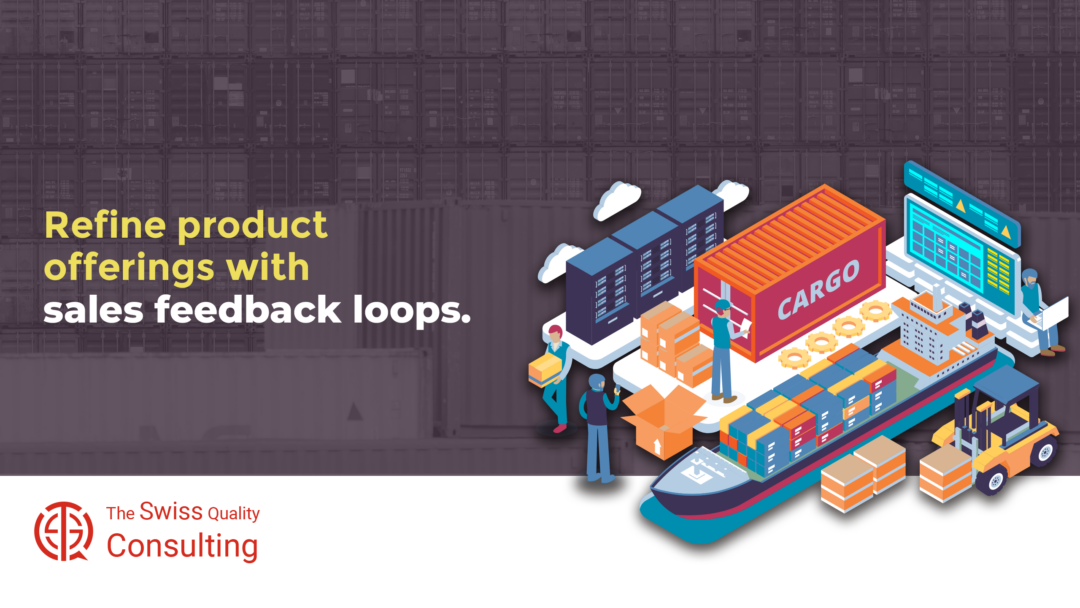Enhancing Business Strategy through Customer-Centric Feedback
Refining Product Offerings with Sales Feedback Loops is an essential strategy for business executives, mid-level managers, and entrepreneurs committed to continuous improvement and market relevance. In a fast-evolving business landscape, leveraging customer feedback to fine-tune product offerings is key to maintaining competitive advantage and business success.
The Role of Sales Feedback Loops in Product Development
Sales feedback loops transcend mere data collection; they serve as a strategic imperative for orchestrating customer-centric growth and building a future where products and services are tailor-made to market needs and customer expectations. This transformative approach involves a systematic process of:
1. Gathering Authentic Customer Insights: By actively soliciting feedback directly from the sales experience, companies gain access to unfiltered and real-time insights into customer preferences, pain points, and overall satisfaction levels. This empowers them to understand the customer journey intimately and identify areas for improvement.
2. Analyzing Data for Actionable Insights: Implementing effective data analytics tools enables businesses to extract valuable insights from the gathered feedback. This includes identifying trends, pinpointing recurring issues, and uncovering opportunities to optimize product offerings, sales strategies, and customer service approaches.
3. Empowering Sales Teams with Real-Time Feedback: Equipping sales teams with immediate access to customer feedback empowers them to address concerns and objections proactively, personalize the sales experience, and build stronger relationships with customers. This leads to improved sales performance and higher customer satisfaction.
4. Fostering a Culture of Continuous Improvement: By integrating customer feedback into decision-making processes, businesses cultivate a culture of continuous improvement. This ensures that products and services are constantly evolving to meet ever-changing customer needs and market trends.
5. Enhancing Product Development and Innovation: By directly incorporating customer feedback into product development, companies can ensure that their offerings are not only innovative but also resonate with the target audience. This leads to increased product adoption, reduced development costs, and a competitive edge in the market.
6. Building Stronger Customer Relationships: Actively listening to and addressing customer feedback demonstrates a commitment to building strong, long-lasting relationships. This fosters trust, loyalty, and advocacy, translating to higher customer lifetime value and positive brand sentiment.
7. Measuring the Impact of Feedback-Driven Initiatives: Implementing effective tracking and measurement tools allows businesses to quantify the impact of their feedback-driven initiatives. This provides valuable data-driven insights into the effectiveness of their efforts and allows them to refine their strategies for continuous optimization.
Beyond Feedback Collection: A Foundation for Sustainable Growth and Customer Centricity:
By prioritizing powerful sales feedback loops and leveraging them to drive customer-centric decision-making, companies unlock the true potential for achieving sustainable growth, enduring customer loyalty, and a competitive edge in the market. This transformative approach empowers them to gather authentic insights, analyze data effectively, empower sales teams, cultivate continuous improvement, enhance product development, build strong customer relationships, measure the impact of feedback-driven initiatives, and ultimately build a future where customer satisfaction is not just an aspiration, but a cornerstone of their success.
Embrace the power of sales feedback loops and embark on a journey towards a future where your business operates in lockstep with customer needs and expectations, delivering products and services that resonate deeply and drive remarkable success. By investing in the right tools, fostering a culture of customer-centricity, and empowering your team to listen actively and act decisively, you can unlock the full potential of your organization and build a future where customer satisfaction and business success are intertwined.
Utilizing Data-Driven Approaches to Harness Sales Feedback
Integrating data-driven techniques is crucial in extracting meaningful insights from sales feedback. Advanced analytics and Generative Artificial Intelligence (AI) can help businesses analyze customer feedback at scale, identify trends, and predict future customer needs. This approach allows companies to be proactive rather than reactive in their product development strategies.
Executive Coaching for Effective Feedback Integration
Effectively utilizing sales feedback loops requires strategic leadership. Executive coaching can empower leaders to develop systems and cultures that value customer feedback. Coaching focuses on skills such as data literacy, strategic thinking, and customer-centric leadership, enabling leaders to make informed decisions based on sales feedback.
Communication Strategies for Implementing Feedback
Communication is key in the successful implementation of sales feedback into product refinement. It involves clearly articulating the feedback to product development teams and ensuring that there is a mutual understanding of customer needs and expectations. Effective communication helps in bridging the gap between customer feedback and product development.
Project Management in Feedback-Driven Product Development
Implementing changes based on sales feedback is a project that requires careful planning and execution. Effective project management ensures that feedback is systematically integrated into product development processes. This involves coordinating across departments, managing timelines, and allocating resources to ensure that customer feedback leads to tangible product improvements.
Change Management for Customer-Focused Business Transformation
Adopting a feedback-driven approach to product development often involves significant changes in business processes and culture. Effective change management strategies are essential for a smooth transition. This includes training employees, revising product development processes, and fostering a customer-focused mindset throughout the organization.
Conclusion Refining Product Offerings with Sales Feedback Loops
Refining product offerings with sales feedback loops is a strategic approach that goes beyond mere product development; it’s about creating a responsive, customer-focused business model. By actively listening to and implementing customer feedback, businesses can enhance their product offerings, meet market demands more effectively, and drive long-term success in an ever-changing business environment.
#SalesFeedback, #ProductDevelopment, #CustomerCentric, #BusinessStrategy, #DataDrivenDecisions









